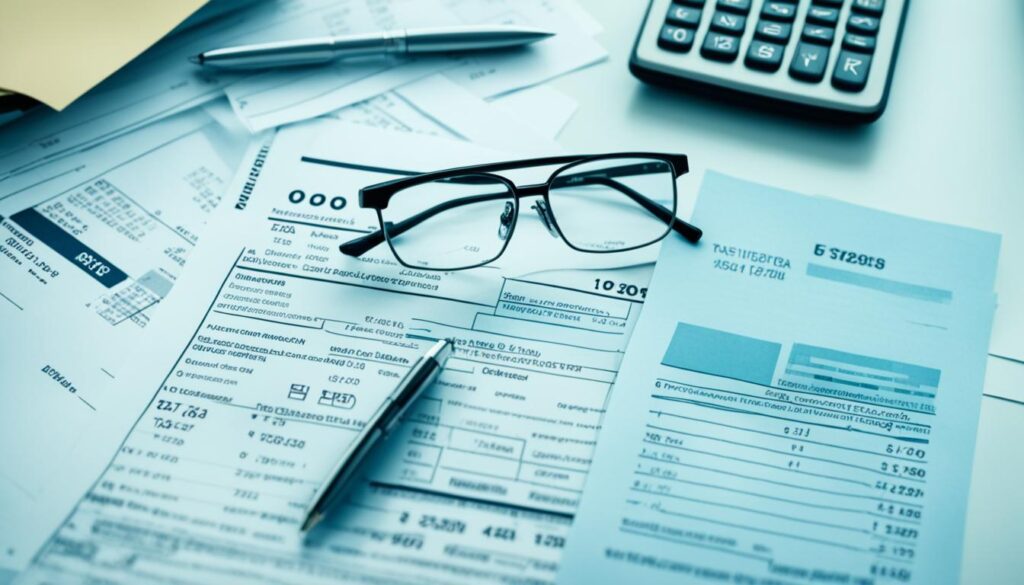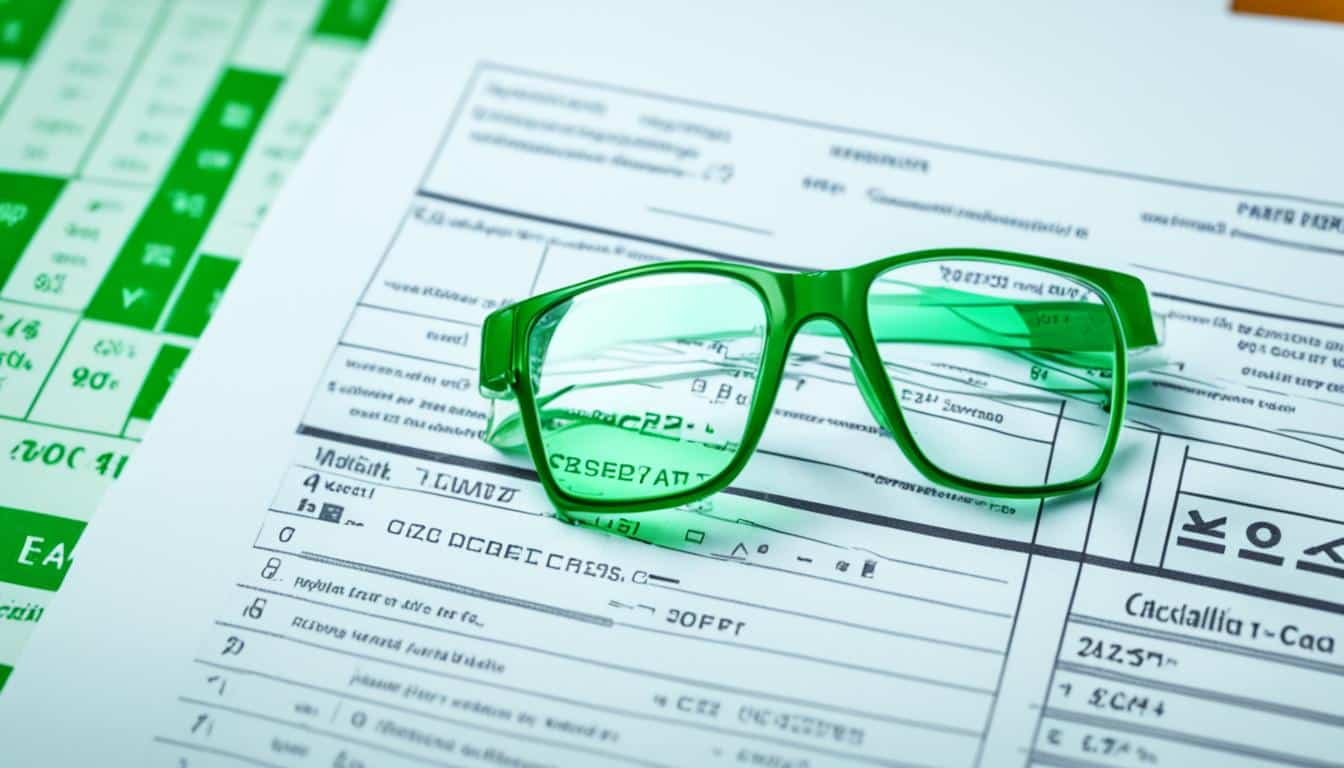Did you know that your eye tests and prescription glasses might just earn you some tax relief? It’s true! Vision care expenses can be tax-deductible under specific conditions. But what makes them eligible?
First, the costs must be vital for your vision health. Things like prescription glasses or treatments for myopia, hyperopia or other vision issues count. These costs must also be needed for medical reasons.
And a big point is, these costs shouldn’t be paid back by someone else.
Also, if your total medical expenses are over 7.5% of your adjusted gross income, you could save on taxes. This includes eyeglasses, contact lenses, and their cleaners if a doctor says you need them for your health. Remember to list these costs in detail on a Schedule A IRS form and make sure they fit with all your medical expenses for the year.
Keeping good records is very important. Keep all your receipts and important papers. Make sure to get advice from a tax professional for the best outcome. So, next time you’re getting your eyes checked, remember, there might be some tax savings waiting for you!
Key Takeaways
- Eye tests and prescription glasses can be tax-deductible under certain conditions.
- The expenses must be necessary for treating or diagnosing vision issues to qualify.
- If your medical expenses for eyewear are over 7.5% of your adjusted gross income, you could get tax benefits.
- Contact lenses and cleaners are also tax-deductible if your doctor says you need them.
- It’s crucial to list these expenses carefully on a Schedule A IRS form and keep good records.
Understanding Tax Deductions for Vision Care

Figuring out tax deductions for vision care is a bit like trying to see clearly through smudged glasses. But don’t worry. We’re here to lay out what counts and what common expenses are eligible.
What Qualifies for Tax Deductions?
To get an eye exam deduction, it must mainly be for health reasons. This means it’s important for your vision’s health, not just for style. Things like prescription eyeglasses and eye surgeries often qualify.
- Prescription eyeglasses
- LASIK surgery
- Cataract surgery
- Glaucoma treatments and implants
Even eye bandages and enzyme cleaners for contacts can sometimes be deducted.
Common Vision-Related Medical Expenses
Want to know what vision expenses you can deduct? Here’s a list that might help:
- Prescription glasses and contact lenses
- Eye surgeries such as LASIK and cataract removal
- Eye care accessories like cleaning solutions
- Vision insurance premiums
- Travel expenses for medical treatments
| Expense Type | Description | Deductible? |
|---|---|---|
| Prescription Glasses | Medical necessity for clear vision | Yes |
| LASIK Surgery | Corrective eye surgery | Yes |
| Glasses for Fashion | Eyewear purely for aesthetic reasons | No |
If something is clearly for medical use, like prescription glasses, it usually qualifies. But, items used for both health and looks might not. Keeping good records and talking to a tax expert can help make everything clear.
Are Eye Tests and Glasses Tax Deductible?
For work, safety glasses can be tax deductions. If needed for job safety, they might not add to your taxes. This keeps you from paying more taxes while keeping your eyes safe at work.
But, diving into tax laws is complex. Safety glasses differ from regular glasses in the tax world. To play it safe, here’s what you need to understand:
- Safety Compliance: Make sure your safety glasses meet job safety rules and are vital for your work.
- Not for VDU Purposes: If glasses are for computer use, they may not be tax deductible.
- Employee Benefits: Watch out if you get safety glasses as a work benefit. It could affect your taxes.
Since tax rules on safety glasses are not crystal clear, a tax expert is your best bet. They can decode the tax jargon. They’ll help you understand if your safety glasses are a tax deduction or a tax trap.
| Criteria | Details |
|---|---|
| Type of Glasses | Prescription safety glasses |
| Usage | Required for occupational safety, not VDU purposes |
| Benefits | Potential non-taxable benefit |
| Consultation | Advised to seek expert tax consultation |
Claiming Vision Care Expenses: What To Know
Trying to save on vision care might seem complicated. But, there are keys to making it easier. Keeping track of your spending and knowing what counts helps you claim deductions for eyewear.
How to Claim Your Eyeglasses as a Tax Deduction
If you want to deduct eyeglasses on your taxes, itemize your deductions. It means keeping track of every penny. Keep your receipts and bills safe. You must claim your medical expenses in the year you pay for them.
Remember, you can’t get reimbursed twice. If you get money back from insurance, you can’t claim it again.
Tax Deduction Tips for Employees and the Self-Employed
If your job involves a lot of computer work, your boss might pay for your eye tests and basic glasses. But, luxury frames are not tax deductible. Self-employed people might want to write off their glasses as a business cost if they’re only for work.
Yet, proving this use is hard. Company directors face similar challenges. They might be able to claim tests and glasses for business, but they need to watch out for extra taxes and paperwork.
- Keep thorough records of all vision-related expenses.
- Itemize deductions on Schedule A to claim eyeglasses.
- Understand employers’ limitations on covering vision care.
- Self-employed individuals should justify eyewear as a business expense.
- Company directors need to prepare for additional paperwork and tax implications.
Knowing these tips could save you a lot on taxes through eyeglasses tax breaks. But, getting a tax break on eye exams means you must track everything carefully and play by the rules. So, be alert and up to date!
| Deduction Type | What’s Covered | Important Notes |
|---|---|---|
| Employees | Eyesight tests, Basic glasses | Must be for display screen work |
| Self-Employed | Eyewear used solely for business | Proving this can be challenging |
| Company Directors | Eye tests, some eyewear | May lead to taxable benefits |
Conclusion
Eyeglasses and eye tests can help you get tax deductions. This is true under certain medical and expense rules. It applies to employees, the self-employed, and company directors. But, understanding the rules fully is key.
Most important, your eyewear expenses must be needed for vision correction. The fancy looks don’t count. If you work for yourself or are a company leader, showing your glasses are necessary for your job helps. This can affect what tax benefits you get.
To make the most of tax savings and steer clear of problems, keep detailed records. Get advice from tax experts or eye care pros. They can make sure your claims are on track. Doing this right can improve your tax return. It could mean savings that really help.








